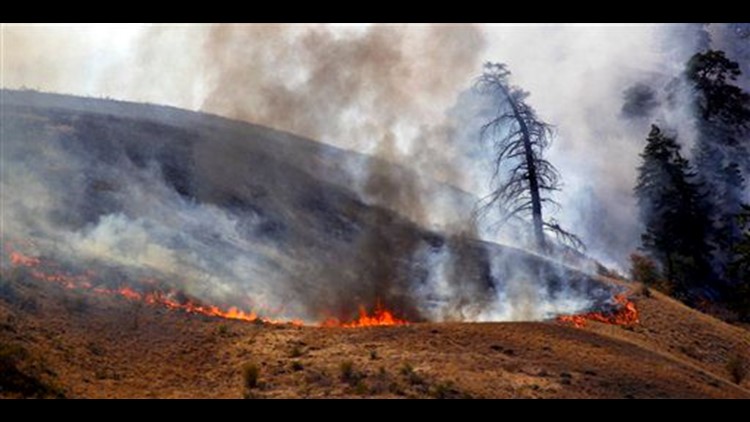WENATCHEE, Wash. (AP) — Crews in central Washington and Wyoming worked Monday to protect homes from two of the many wildfires burning across the West as a destructive fire season stretches into September with no relief expected from the weather anytime soon.
Winds and temperatures remain high in parts of the region, worrying officials who had hoped cooler temperatures and moisture would eventually tamp down the threat. The National Weather service issued red-flag warnings for wide swaths of eastern Washington and Oregon, Idaho, Montana and all of Wyoming, meaning conditions could exacerbate blazes.
In Wyoming, authorities evacuated 500 people from homes and cabins near Casper, and warned another 1,000 people in the ski resort town of Jackson to be ready to leave.
The Sheep Herder Hill Fire about 10 miles southeast of Casper started Sunday and grew quickly, burning at least six structures overnight and scorching more than 15 square miles of pine forest and sagebrush by Monday afternoon. State Forester Bill Crapser wasn't sure if any of the structures burned were homes but said even more buildings may have been lost.
Gov. Matt Mead activated two Wyoming Army National Guard UH-60 Blackhawk helicopters, each with 600-gallon buckets, to dump water on the fire. A total of 12 Wyoming Army and Air National Guard troops were activated, including a liaison to coordinate possible aid to the Jackson-area fire in northwest Wyoming.
About 1,000 Jackson residents were told to prepare to evacuate Monday as the Little Horsethief Fire burned about 2,000 acres in a forested, mountainous area less than two miles south of town. The blaze was 15 percent contained.
Fire trucks were being positioned in the southeast corner of the town of about 9,500 residents.
In Washington state, rains that fell in the Seattle area after a 48-day dry stretch didn't make it over the Cascade Mountains that divide the state's western and eastern halves. And the forecast was for gusts that could fan the flames of dozens of blazes.
"Winds are starting to kick up," Wenatchee police Sgt. John Kruse said. "That is going to be an issue for firefighters to deal with."
Only a shed has been lost near Wenatchee, and no injuries have been reported at what appeared to be the most-threatening of many wildfires sparked by lightning in the state Saturday.
Residents of about 180 homes on the west side of Wenatchee, about 140 miles east of Seattle, were told to evacuate Sunday, Kruse said, and a shelter was set up at a church because of the 500-acre blaze that continued to burn in the hills. It was so windy that newly arriving crews struggled to set up their tents.
Connie Beck of Wenatchee was ready to get herself, her things and her dog out of harm's way if needed, but hoped crews would stop the fire.
"I packed my pictures, my recipe box and a couple of days' worth of clothes, and Mollie," she said, pointing to her Dachshund.
In Montana, residents of about 350 homes threatened by a wildfire west of Hamilton were told to leave, while a rapidly growing blaze east of Roundup threatened 25 to 35 houses in a rural subdivision and forced an unknown number of residents to evacuate.
Blazes have scorched more than 8.1 million acres across the West so far in 2012, up from the 10-year average of 6.1 million, according to the National Interagency Fire Center.
Mild recent fire seasons combined with moderate winter weather contributed to a buildup of the kind of undergrowth that fuels forest fires, said Jeremy Sullens, a wildfire analyst for predictive services at the center. The warm dry summer exacerbated things.
"Finer fuels allow fires to burn more rapidly and have more active fire behavior," Sullens said, adding that the fuels buildup explains why fewer fires have burned more acres altogether.
Fire officials would like to have a wet fall, but Sullens said that's not in the weather forecast for the near future.
The West's wildfire season started in earnest in Colorado during an unusually warm and dry March. A wildfire charred 6 square miles in the foothills outside Denver, killing three people and destroying 23 homes. March usually is one of the snowiest months, but this year it was Denver's warmest and driest on record.
At higher elevations, the weather ate up snowpack weeks ahead of normal. Red-flag warnings were issued in many parts of Colorado on an almost routine basis throughout the month.
A look at some of the other wildfires burning across the West:
— Southeast of Portland, Ore., people camping and hiking near a blaze spreading in the Deschutes National Forest near Sisters were evacuated as gusty winds whipped the fire through dead trees.
The fire area was estimated at about 3 square miles, or 2,000 acres, but KTVZ-TV reported a flight to get a precise picture was canceled by mechanical problems. Four vehicles at a trailhead were destroyed Sunday.
— In Washington state, other fires that apparently started over the weekend burned more than 11,000 acres of sagebrush and grass, and were threatening homes near Grand Coulee Dam in Douglas and Grant counties. Another fire burned 200 acres of sagebrush and grass near Odessa in Lincoln County.
As many as 80 fires along the east slopes of the Cascades were set by Saturday night lightning strikes, the Department of Natural Resources said. Most remained small. The state Emergency Operations Center was activated Sunday evening and dispatched four interagency fire management teams to help local firefighters and coordinate state assistance.
— In Northern California, improving conditions aided about 1,400 firefighters battling a blaze that is threatening about 300 homes outside of Ukiah.
— In Idaho, a blaze visible for miles forced closures in the Payette National Forest.
___
Associated Press writers Donna Gordon Blankinship and Doug Esser in Seattle, Matt Volz in Helena, Mont., and Colleen Slevin in Denver contributed to this report.
Copyright 2012 The Associated Press.



